The winners for the 2025 ASLE Book Awards were announced and celebrated on July 9 at the Authors and Awards Reception at the Sixteenth ASLE Biennial Conference at the University of Maryland, College Park. The awards, in the categories of ecocriticism and environmental creative writing, were established in 2007 and have been given biennially to recognize excellence in the field. Congratulations to our winning authors and honorable mentions!
ASLE Ecocritical Book Award Winner
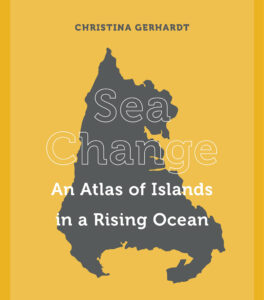 Christina Gerhardt, Sea Change: An Atlas of Islands in a Rising Ocean
Christina Gerhardt, Sea Change: An Atlas of Islands in a Rising Ocean
University of California Press, 2023
Judges comments:
A stunning and powerful book, Gerhardt’s Sea Change pushes the boundaries of what any critical study or collection in the environmental humanities might accomplish. It pairs a powerful range of primary sources — poems, essays, and statements written by littoral people around the world — with incisive critical essays that index a huge range of critical sources and bring them to bear in exploring the precarious position of Islanders, islands, and their ecologies across the planet.
This is a strikingly original and beautifully produced book that expands the formal and conceptual bounds of ecocritical scholarship. Gerhardt performs the impressive feat of combining a strong command of the underlying science with both a deep appreciation of island cultures and a commitment to accessible and engaging writing.
This is a stunningly beautiful book, not a volume that one would read through but one to peruse over time, leaving open pauses for reflection. It is indeed an atlas, of the world ocean’s dozens and dozens of islands—most inhabited, some uninhabitable—which are presented to us in all their local diversities, both natural and cultural. Every one of them is threatened by sea level rise.
Honorable Mention:
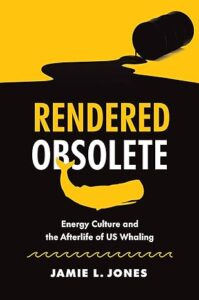 Jamie L. Jones, Rendered Obsolete: Energy Culture and the Afterlife of US Whaling
Jamie L. Jones, Rendered Obsolete: Energy Culture and the Afterlife of US Whaling
University of North Carolina Press, 2023
Judges Comments:
This book works brilliantly on a number of levels. It has broad insights for those thinking about how to work with historical texts in a present moment in ways that honor both past and present linguistic and ideological structures. It does a wonderful job theorizing energy in both abstract and specific ways that prove useful for a wide range of scholars.
This is a meticulously researched and very well-written book, which demonstrates an impressive command of theories in energy humanities, oceanic studies and media studies.
Recovering the specificity of whaling culture, including Melville’s Moby-Dick (which connected whales as oil reserves with the fantasy of endless growth and the structural violence of capitalism), and the ways whaling remains enshrined today in the aesthetic exhaustion of “quaint” tourist sites, the extractivist nostalgia of early, racist films, and the nostalgic illustrations of Rockwell Kent, turns out, in this original and surprisingly insightful book, to teach us a lot about how the past never passed, but has been, with its objects and structures, carried forward to our own time. Can we ever let it go?
ASLE Creative Writing Book Award Winner
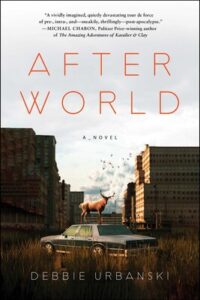 Debbie Urbanski, After World: A Novel
Debbie Urbanski, After World: A Novel
Simon & Schuster, 2023
Judges comments:
After World is a haunting and innovative novel that reimagines the end of humanity through the eyes of an AI storyworker tasked with preserving the life of Sen, the last human witness. Through its experimental structure—blending narrative prose with technical documents, government memos, and linguistic fragments—the novel explores the complex relationship between human consciousness and environmental collapse while questioning who gets to tell the stories of our planetary crisis. Urbanski’s profound meditation on love, loss, and ecological restoration challenges readers to consider what it truly means to save the world, offering a deeply moving examination of sacrifice and survival that speaks to our current environmental moment with both devastating clarity and unexpected hope. The novel’s formal inventiveness serves its thematic concerns perfectly, creating a work that is simultaneously a love letter to the natural world, a requiem for human civilization, and a plea for the unique value of human life.
Honorable Mentions:
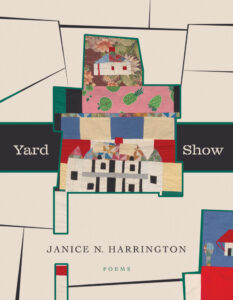 Janice N. Harrington, Yard Show
Janice N. Harrington, Yard Show
BOA Editions, Ltd., 2024
Judges comments:
In Yard Show, Janice Harrington shows how the yard—and the poems—can create a vernacular landscape, in which the arrangements of objects, plants, and words form a divine constellation affirming the creator in place, past, and lineage. The poems are as detailed as they are musical. Working through themes of racism, gender, and poetics, this collection is as informative as it is sharp. It moves like a season change—processions of words roll over the reader, allowing for contemplation, surprise, horror, and self-reflection. The collection makes recurring use of definition poems: tight, resonant pieces that reclaim and reshape language, opening the fixed meanings of words to personal and political reinterpretation. The poems are concise; the violence of being back on United States land permeates the air and soil they arrive from. This is a collection that insists on presence, on care, and on the transformative power of both poetry and yard work.
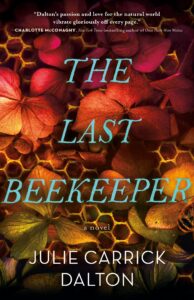 Julie Carrick Dalton, The Last Beekeeper
Julie Carrick Dalton, The Last Beekeeper
Forge, 2023
Judges comments:
Julie Carrick Dalton’s The Last Beekeeper is a dystopian novel of life after the environmental collapse of common pollinators. The novel begins with Sasha Severn’s return to her childhood home and site of the last known beehive, where her father was blamed for its demise and subsequently incarcerated. In search of her father’s hidden research, she integrates with the squatters who have made this place home foraging and struggling to get by. A book for all ages, Dalton’s writing explores complex themes with ease, pitting truth against power, government programs against local self-sufficiency in food security, and found family bonds against those tied by blood. It is a story of overcoming adversity through personal growth, leading to redemption.
